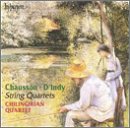A Zeitgeist of Expressionism...
Sébastien Melmoth | Hôtel d'Alsace, PARIS | 06/07/2008
(5 out of 5 stars)
".
The art realized on this disc neatly illustrates an aspect of why the Fin de Siècle-Belle Époque (c. 1885-1915) is such a fascinating period in the intellectual history of Western civilization: there existed a zeitgeist of evolutionary transformation from later-Romanticism unto hyper-Romanticism--i.e., Expressionism, while simultaneously befell a deep melancholy yearning for tender beauty which found utterance in the various styles of Art Nouveau.
Such a period is unique in human events--(and, by the way, this manifests the validity of Hegel's teleological philosophy of history).
.
So: D'Indy and Chausson: Parisians whose ethos perfectly represents that cool Northern-Gallic love of precision, clarity, transparency, and logic.
.
These their String Quartets exibit in form fine part-writing with application of piquant string technique. Heirs of Beethoven, in content they suggest the aforementioned duality of Expressionism and Art Nouveau.
The zeitgeist which contemporaneously effected Debussy, Schönberg, and Skryabin hangs over all.
.
See too:
Lectures on the Philosophy of World History (Cambridge Studies in the History and Theory of Politics)
The Decline of the West (Oxford Paperbacks)
A Study of History Abridgement of Volumes I-VI
A History of Civilizations
The Proud Tower: A Portrait of the World Before the War, 1890-1914
.
Franck: Quintet in Fm; Chausson: String quartet in Cm
Franck, Chausson: String Quartets
Chausson: String quartet in Cm; Faure: Poème d'un jour No1,Op21/1
Chausson: String Quartets; Roussel: String Quartets [United Kingdom]
Ernest Chausson: Chamber Music
.
(Cover-art nice Impressionistic-Realistic "Fishing" [1878] by Gustave Caillebotte.)
."

